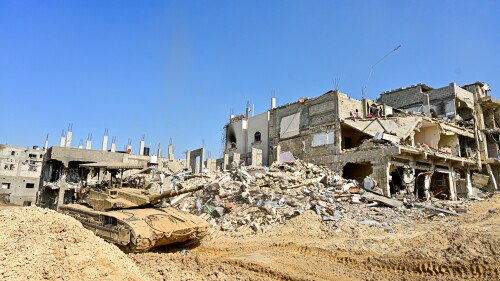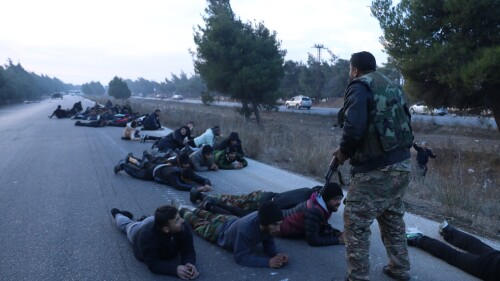Over the weekend, the US and Iran held opening talks in Oman on Tehran’s nuclear programme. With the first round concluded, the Iranian regime’s position on the negotiations is becoming clearer. The Islamic regime, which prides itself on its strategic patience, intends to buy time, while avoiding any major and irreversible concessions. Whether Donald Trump’s administration will prove willing to accommodate Iran’s demands is another matter entirely.
Iran is determined to ensure that the current negotiations maintain a similar narrow focus to those a decade ago.
Iranian foreign ministry spokesman Ismail Baqaei said on Sunday that Iran would refuse to discuss anything other than the nuclear programme in the talks. Tehran, Baqaei said, ‘will not have any talks with the American side on any other issue.’
One of the major criticisms of the 2015 nuclear deal (known as the JCPOA) negotiated by Barack Obama’s administration was that it failed to address other aspects of Iran’s drive for regional hegemony. Specifically, the Iranian ballistic missile program and Tehran’s support for an array of proxy political-military organisations across the Middle East were left out of the discussion. The result was that the JCPOA removed sanctions on Iran, enabling it to ratchet up its campaign of subversion across the region, and to test-fire more than 30 nuclear-capable ballistic missiles over the past decade.
Trump pulled the US out of the agreement in 2018, declaring he could negotiate a ‘better’ deal. Iran, meanwhile, is determined to ensure that the current negotiations maintain a similar narrow focus to those a decade ago.
With this narrow focus ensured, the Iranian regime will then seek one of two outcomes. It wants either a renewed nuclear agreement which, in its essentials, resembles the JCPOA, or a drawn-out negotiating process which leads nowhere but enables Iran to avoid further sanctions and the possibility of US or Israeli military action against its nuclear programme.
Time is what the Iranian regime needs above all now, and what it hopes the US’s desire for a renewed nuclear deal will provide. The last couple of years have not been auspicious for the Islamic Republic. It needs a period of quiet to recover and replenish its capacities.
All of Iran’s setbacks, with the exception of the loss of the Assad regime, are reversible. To reverse them – to rebuild, replenish, re-arm, and recruit – Iran needs only time.
Iran’s strategy of proxy warfare, which had brought it unprecedented power and influence across the region, has suffered a number of very telling blows since October 2023. Its Palestinian client organisations, Hamas and Islamic Jihad, though not destroyed, have suffered enormous casualties and damage in Gaza. Lebanese Hezbollah, Iran’s most powerful proxy, is similarly beleaguered. Its historic leader, Hassan Nasrallah, is dead. A significant part of its senior and mid-level leadership echelon has been removed. It has also suffered the destruction of 80 per cent of its long-range missile capacity.
Meanwhile, the Assad regime, a key Tehran ally and link in Iran’s route to the Mediterranean, is gone. The Houthis in Yemen have succeeded in effectively shutting down the Gulf of Aden/Red Sea route to international shipping, but are now the subject of an ongoing US bombing campaign. Even in Iraq, the Iran-aligned Shia militias of the Popular Mobilization Units (PMU) elected to unilaterally cease attacks on Israel. There are now rumours that they may disarm as a result of American pressure.
All this adds up to a profoundly changed regional balance of power, in which the steady gains made by Iran over the last two decades across the Middle East have been reversed.
It is important to note, though, that contrary to some of the more overheated commentary of recent months, the Iranian regional project has not been destroyed, or even conclusively defeated. Rather, it has been weakened, significantly. But all of the setbacks, with the exception of the loss of the Assad regime, are reversible. To reverse them – to rebuild, replenish, re-arm, and recruit – Iran needs only time. This, as we have already noted, is precisely the commodity that the renewed nuclear negotiations with America grant it.
This raises an obvious question. If the Iranian regime constitutes the most powerful anti-Western and Islamist force in the Middle East, and if it has been damaged and now needs time to recover, why are its enemies granting it what it needs? Why – when the regime is vulnerable, its economy in tatters, its regional proxies on the ropes, its standing among its own people at an all time low – are its enemies giving it the time it needs to emerge from its current low point?
If America does not want to support the people of Iran in their gradual efforts to dismantle the ruling regime – a regime that has no legitimacy in the eyes of Iranians – then at the very least, it should stop feeding the regime.
There is no obvious answer, except that it may turn out that the efforts at negotiation will be brief. The US administration may rapidly become aware of the Iranian regime’s needs and tactics, and decide not to accommodate them.
Iranians themselves are watching carefully, and with concern. As one Iran-based supporter of the opposition who I spoke to for this article said:
The recent rise in the value of the toman against the US dollar is being seen by the Iranian regime as a sign of success and progress in the negotiations since yesterday. Reformists have been happily spreading news about the dollar-toman rate on their social media accounts.
If America does not want to support the people of Iran in their gradual efforts to dismantle the ruling regime – a regime that has no legitimacy in the eyes of Iranians – then at the very least, it should stop feeding the regime.
It is too soon to tell, of course, if such sentiments will prove justified, or if the current phase will turn out to be a transient moment preceding renewed American pressure on Tehran. If the former, then the Iranian regime has a good chance of recouping much of the ground it has lost over the last eighteen months of war in the region. The basic structures of the Iranian power arrangement in the region remain intact, if enfeebled. Whether or not the regime manages to build them up again to their former capacity will be decided in Washington, and in Oman, in the coming months.








